Politics
Election: Can Peter Obi Alter Nigeria’s Electoral Calender As He Did In Anambra State

Peter Obi, the Labour Party’s (LP) presidential candidate in the February 25th general election, is no stranger to the judicial corridor.
Almost 20 years ago, Mr. Obi stood for governor of Anambra State on the platform of the newly founded All Progressives Grand Alliance (APGA). The Peoples Democratic Party’s (PDP) Chris Ngige was proclaimed the winner of the contest by the Independent National Electoral Commission (INEC), but Mr. Obi disagreed with the outcome and sought redress in court, where he had a historic victory.
On Monday, March 13, Mr. Obi proclaimed that he would not recognize the INEC-announced outcome of this year’s presidential election because, in his opinion, it is against God’s will for the nation. The All Progressives Congress (APC) candidate Bola Ahmed Tinubu was declared the winner, and he indicated his willingness to dispute the election umpire’s decision-making process. Mr. Obi said this in an interview with Arise Channel. He had claimed to have won the election at a news conference a week earlier and had promised to back up his claims in court.
Early on March 1st, 2023, the INEC electoral commission announced that Mr. Tinubu had won the election.
In the election, Mr. Tinubu defeated 17 other contenders. He received the highest number of votes (8,794,726) overall, which satisfied the first constitutional condition to be proclaimed the victor.
Additionally, he received more than 25% of the votes cast in 29 states, which is more than the 24 states that the constitution requires. Atiku Abubakar of the PDP came in second. In the election, Mr. Obi of the LP finished third with a total of 6,101,533 votes, while Atiku received 6,984,520 votes overall.
However, both Atiku and Obi have since rejected the results as announced by INEC, claiming victory in the election and vowing to challenge the process in court.
Mr. Obi appears to be aware of the complex details of the judicial procedure. He is a winner in the legal system in the election history of Nigeria. A five-member panel of the Court of Appeal overturned Mr. Ngige’s victory and declared Mr. Obi the winner of the state’s April 2003 gubernatorial election on March 15, 2003, capping two years and 11 months of legal fireworks that marked the end of Mr. Ngige’s term as governor of Anambra State.
The appeals court maintained the lower court’s conclusion that Mr. Obi should have been declared the victor and sworn in as the governor of Anambra State on May 29, 2003. The judgement was the result of Mr. Obi’s determination to carry out his mission through the legal system in spite of insurmountable obstacles.
When Mr. Obi was sworn in as governor on March 17, 2006, Anambra became the first state in the nation to change the timeline for governorship transitions since he was the first candidate to successfully challenge an incumbent governor in court. However, Mr. Obi was impeached and ousted from office by the state House of Assembly on November 2nd, 2006, less than eight months after taking office.
The following day, on November 3, 2006, his deputy, Virginia Etiaba, was sworn in as the actual governor in his place, becoming Nigeria’s first female state governor.
Mr. Obi approached the court for a second time. After then, it was time to contest his impeachment. He contended that he did nothing wrong to merit being fired. The 2007 governorship campaign was already under way as he battled in court to retain his authority.
On 9 February 2007, he was reinstalled as governor after winning at the Enugu Division of the Court of Appeal. Mrs. Etiaba returned to her prior role as deputy governor after handing him the state’s reins of authority.
Mr. Obi was advised to gather and submit a nomination form as the APGA’s candidate for the governorship election that was rapidly approaching, but he refused, claiming that he still had three years left in his term as governor despite having only been in office for about a year following Mr. Ngige’s ouster by the appeal court.
His attitude at the time sparked debates both in Anambra State and across the country, with some observers criticizing him for pushing his luck too far while others urging him to run in an election that he was likely to win on his qualifications. Yet Mr Obi kept to his gun by veering clear from the 2007 governorship polls despite the entreaties for him to compete.
As expected, Mr. Obi lost the gubernatorial position for a third time when he was forced to resign on May 29, 2007. Andy Uba, the PDP candidate, was declared the winner by INEC following the governorship election on April 14, 2007, which he abstained from because he believed it was illegal in the state. He was then sworn in as governor on May 29, 2007.
Mr. Obi continued to pursue his ongoing legal battle, unconcerned about the upcoming governorship race. His main argument was that the four-year term to which he was entitled as a result of his restored victory in the general elections of April 19, 2003, only began to run on March 17, 2006, the day he took office. In a momentous decision on June 14, 2007, the Supreme Court upheld Mr. Obi’s argument by dismissing Mr. Uba and restored Mr. Obi as governor. The verdict brought Mr. Uba’s tenure to an abrupt conclusion and made way for Mr. Obi to finish his four-year term on March 17, 2010.
Mr. Obi ran again and won a second term. On March 17, 2014, he passed over to his successor, Willie Obiano, having successfully completed his second term without hindrance.
Mr. Obi’s legal fights not only made Anambra the first state in Nigeria to have a governorship election outside of the traditional election period, but they also paved the way for Kogi, Osun, Ekiti, Bayelsa, Edo, Ondo, and Imo to follow suit.
However, reiterating his respect for traditional rulers and religious leaders, the former Anambra State governor disagreed with the narrative that the outcome of the recent polls, as declared by INEC, was God’s will for Nigeria during an interview with Arise Television on Monday.
In Peter Obi’s words, “I’m very respectful to them and I think that they should be respected for what they represent to society. But I disagree with them. What they are actually preaching is the problem of Nigeria. The problem of Nigeria is accepting wrongdoing and accepting what is unacceptable.
“That is using God’s name in vain. That is not what God is saying. God said do not use my name in vain. So, what they are saying is not God’s wish, it is not God’s plan for Nigeria. God’s will is that when you do the right thing then in the end it is well.”
He stated that Nigeria has laws governing the conduct of elections, and that it is not God’s will that they should be broken.
Mr. Obi received more than six million votes in the presidential election despite being initially perceived by commentators as a lackluster underdog in the contest. Moreover, he received the same amount of victories as Mr. Tinubu and Atiku, winning 12 states in total (including Abuja).
By contesting the presidential election in court, Mr. Obi, like Atiku, hopes to accomplish something no other losing presidential candidate has done.
No candidate has successfully challenged the outcome of the presidential election since the current democratic dispensation began 24 years ago. Despite flaws in the elections, previous presidential elections in 2007, 2011, and 2019 were unsuccessfully challenged.
Muhammadu Buhari, the current president, filed legal challenges against the 2007 and 2011 presidential elections. Atiku, the second-place finisher in this year’s presidential election and the second-place finisher in the previous four as well, attempted a legal challenge in 2019 but was unsuccessful. Atiku and Mr. Obi both play major roles in the upcoming legal struggle for this year’s election.
Due to numerous contentious court decisions in recent years, many Nigerians may have lost faith in the country’s courts, but Mr. Obi does not appear to share this cynicism.
So, the topic of whether Mr. Obi would succeed in changing the date of Nigeria’s presidential election, as he did for the governorship 20 years ago, is one that many experts and watchers keep asking.
-
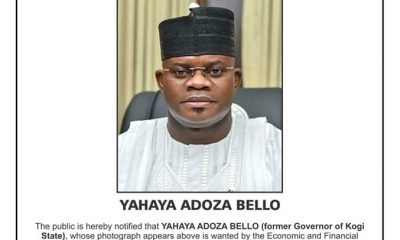
 News5 days ago
News5 days agoJUST-IN: EFCC declares Kogi ex-gov, Yahaya Bello wanted
-

 Sports3 days ago
Sports3 days agoFA Cup: Man Utd suffer fresh triple injury blow ahead Coventry clash
-

 News5 days ago
News5 days agoPort Harcourt company gifts plot of land to Law Graduate, Anyim Veronica
-
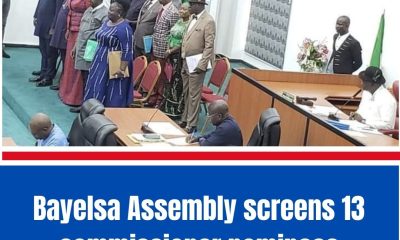
 Politics5 days ago
Politics5 days agoBayelsa Assembly screens 13 commissioner nominees
-
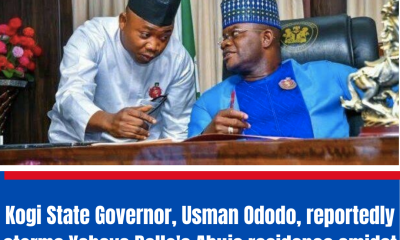
 Politics6 days ago
Politics6 days agoKogi State Governor, Usman Ododo, reportedly storms Yahaya Bello’s Abuja residence amidst EFCC siege.
-
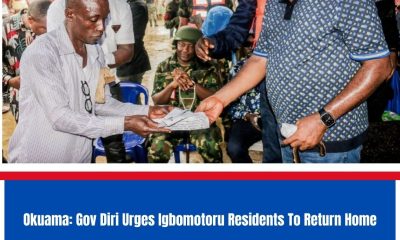
 News7 days ago
News7 days agoOkuama: Gov Diri Urges Igbomotoru Residents To Return Home
-
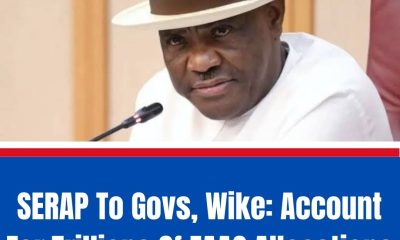
 Politics2 days ago
Politics2 days agoSERAP To Govs, Wike: Account For Trillions Of FAAC Allocations
-
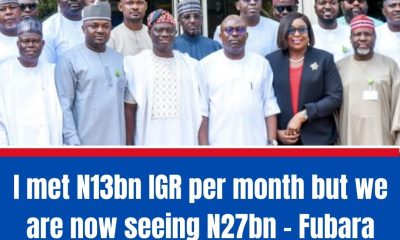
 Business2 days ago
Business2 days agoI met N13bn IGR per month but we are now seeing N27bn – Fubara




















